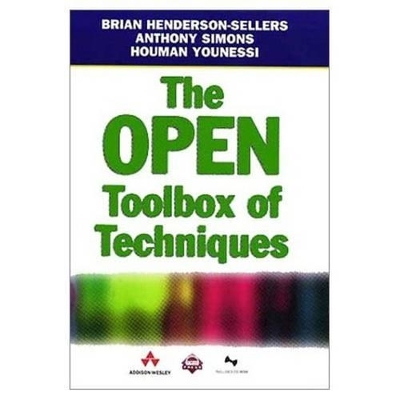
The OPEN Toolbox of Techniques
Addison Wesley
978-0-201-33134-9 (ISBN)
- Titel ist leider vergriffen;
keine Neuauflage - Artikel merken
The OPEN Toolbox of Techniques describes how to deliver object-oriented systems, from requirements, through project management and modeling, to coding and reuse. It focuses on actually doing object-oriented development and shows how to use specific techniques supported by the OPEN Process framework, described in a companion volume The OPEN Process Specification. A basic knowledge of object-oriented concepts is assumed so that the book can focus on showing the reader how to use an OO methodology in their organization. The first section summarizes the OPEN methodological framework, describes the concepts, notations and deliverables and goes on to give an overview of the techniques. However, the meat of the book is the OPEN Toolbox, a complete description of each technique organized alphabetically for ease of reference. Each entry includes a full description of the technique, how it is used, typical tasks for which it is needed, underpinning concepts and preconditions and related techniques.By referring back to the overview chapter, the reader will be able to see how these techniques fit into the process lifecycle of OPEN, resulting in a uniquely practical and eminently accessible handbook.
The accompanying CD-ROM includes *additional experimental and non OO techniques that may be used within the OPEN framework *an overview of the theoretical underpinnings of the OPEN techniques *demonstration versions of commercial tools that have been developed for use with OPEN
Foreword. Preface. List of abbreviations. 1 Overview of OPEN. 1.1 What is OPEN? 1.2 OPEN's Overall Architecture. 1.3 OPEN's Contract-Driven Lifecycle: two examples. 1.4 OPEN's Tasks. 1.5 OPEN's Techniques. 1.6 Products, Deliverables and Modeling Language. 1.7 Further Information. 1.8 About This Book. 2 OPEN Concepts, Notations and Deliverables. 2.1 Overview: Modeling languages. 2.2 OPEN Concepts. 2.3 Notations for OPEN. 2.3.1 OPEN's preferred notation: COMN. 2.3.2 UML notation. 2.3.3 Other notations. 2.4 Diagram Types. 2.5 OPEN Deliverables. 3 OPEN's Techniques. 3.1 Techniques Selection Criteria. 3.2 Techniques Relating to User Requirements. 3.3 Project Management and Quality Assurance Techniques. 3.4 Modeling Techniques for Seamless Analysis and Design. 3.5 Techniques for Database Design and Construction. 3.6 Techniques for Distributed Architectures. 3.7 Techniques for User Interface Design. 3.8 Reuse Strategies and Supporting Techniques. 3.9 Coding Styles and Implementation Techniques 3.10 Some Useful Techniques in Training and Education. 4 The Future of OOAD and OPEN. 4.1 OOAD in the Future: towards convergence. 4.2 OPEN-ing the dOOr to the Future. 4.3 Final Summary iii Appendix A Reference Section: Details of the OPEN Techniques (in alphabetical order). Appendix A1 Core techniques. Appendix A2 Suites of Techniques. Bibliography. Index On the accompanying CD Appendix A3 More Experimental Techniques. Appendix A4 Non-OO/Traditional Techniques with Limited Utility in OPEN. Appendix B Supporting Reference Material / Concepts, Artefacts and Theory. CASE tools (in alphabetical order). ObjectMaker. Process Engineer. Simply Objects
| Erscheint lt. Verlag | 29.10.1998 |
|---|---|
| Verlagsort | Boston |
| Sprache | englisch |
| Maße | 173 x 243 mm |
| Gewicht | 788 g |
| Themenwelt | Mathematik / Informatik ► Informatik ► Betriebssysteme / Server |
| Mathematik / Informatik ► Informatik ► Datenbanken | |
| Informatik ► Software Entwicklung ► Objektorientierung | |
| ISBN-10 | 0-201-33134-9 / 0201331349 |
| ISBN-13 | 978-0-201-33134-9 / 9780201331349 |
| Zustand | Neuware |
| Haben Sie eine Frage zum Produkt? |